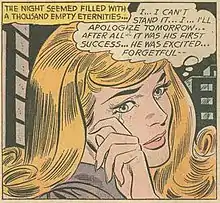.jpg.webp)
.jpg.webp)
Crying Girl is the name of two different works by Roy Lichtenstein: a 1963 offset lithograph on lightweight, off-white wove paper and a 1964 porcelain enamel on steel.
Background
During the late 1950s and early 1960s, many American painters began to adapt the imagery and motifs of comic strips. Lichtenstein in 1958 made drawings of comic strip characters. Andy Warhol produced his earliest paintings in this style in 1960. Lichtenstein, unaware of Warhol's work, produced Look Mickey and Popeye in 1961.[1] In the early 1960s, Lichtenstein produced several "fantasy drama" paintings of women in love affairs with domineering men causing women to be miserable. These works served as prelude to 1964 paintings of innocent "girls next door" in a variety of tenuous emotional states.[2] Picasso's depictions of weeping women may have influenced Lichtenstein to produce portrayals of vulnerable teary-eyed women.[3] Another possible influence on his emphasis on depicting distressed women in the early to mid-1960s was that his first marriage was dissolving at the time.[4] Lichtenstein's first marriage to Isabel Wilson, which resulted in two sons, lasted from 1949 to 1965.[5]
Although single-panel comic representations depict a moment in time, this is an example of one in which the moment is "pregnant" with drama related to other times.[6] This work also marks a phase in Lichtenstein's career, when many of his works were named with present-participial names such as Sleeping Girl, Crying Girl and Blonde Waiting, which accentuates the works' "relation to process and action."[6]
1963 lithograph
The lithograph on lightweight, off-white wove paper measures 16 by 24 inches (40.6 cm × 61.0 cm).[7] Chuck Close claims to have purchased this from Leo Castelli on a visit to New York in 1963 for $10 ($96 in 2022 dollars[8]). Close recalled the purchase "I remember I bought [a] Roy Lichtenstein...for [ten] dollars from Leo Castelli at Lichtenstein's first [sic] show. I brought it back to Yale and I was attacked unmercifully."[9] Lichtenstein's first solo show at The Leo Castelli Gallery in New York City, which sold out before opening, ran from February 10 through March 3, 1962.[10][11] His second solo exhibition at the Leo Castelli Gallery ran from September 28 – October 24, 1963.[10][12]
1964 enamel

The porcelain enamel on steel measures 46 by 46 inches (116.8 cm × 116.8 cm).[13] It was adapted from a 1963 comic strip panel: Secret Hearts, no. 88 (June 1963), DC Comics.[14] It has been held at the Milwaukee Art Museum, since 1965, and is considered to be one of Roy Lichtenstein's earliest attempts at producing enamel-on-steel works from the same type of comic-strip imagery he had begun producing as conventional hand-painted canvases.[15]
See also
Notes
- ↑ Livingstone, Marco (2000). Pop Art: A Continuing History. Thames and Hudson. pp. 72–73. ISBN 0-500-28240-4.
- ↑ Waldman, p. 113.
- ↑ Schneider, Eckhard, ed. (2005). Roy Lichtenstein: Classic of the New. Kunsthaus Bregenz. p. 142. ISBN 3-88375-965-1.
- ↑ "Roy Lichtenstein at the Met". LichtensteinFoundation.org. Archived from the original on June 27, 2013. Retrieved June 10, 2013.
- ↑ Monroe, Robert (September 29, 1997). "Pop Art pioneer Roy Lichtenstein dead at 73". Associated Press. Retrieved June 10, 2013.
- 1 2 Steiner, Wendy (1987). Pictures of Romance: Form against Context in Painting and Literature. University of Chicago Press. p. 156. ISBN 0226772292.
Drowning Girl Lichtenstein.
- ↑ "Crying Girl". LichtensteinFoundation.org. Retrieved June 10, 2013.
- ↑ 1634–1699: McCusker, J. J. (1997). How Much Is That in Real Money? A Historical Price Index for Use as a Deflator of Money Values in the Economy of the United States: Addenda et Corrigenda (PDF). American Antiquarian Society. 1700–1799: McCusker, J. J. (1992). How Much Is That in Real Money? A Historical Price Index for Use as a Deflator of Money Values in the Economy of the United States (PDF). American Antiquarian Society. 1800–present: Federal Reserve Bank of Minneapolis. "Consumer Price Index (estimate) 1800–". Retrieved May 28, 2023.
- ↑ Close, Chuck; Robert Storr; Kirk Varnedoe; Deborah Wye & Glenn D. Lowry (2002). Chuck Close. Museum of Modern Art. p. 204. ISBN 0870700669.
- 1 2 Judd, Donald (2009). "Reviews 1962–64". In Bader, Graham (ed.). Roy Lichtenstein: October Files. The MIT Press. p. 2. ISBN 978-0-262-01258-4.
- ↑ Tomkins, Calvin (1988). Roy Lichtenstein: Mural With Blue Brushstroke. Harry N. Abrams, Inc. p. 25. ISBN 0-8109-2356-4.
- ↑ "Chronology". Roy Lichtenstein Foundation. Archived from the original on June 6, 2013. Retrieved June 9, 2013.
- ↑ "Crying Girl". LichtensteinFoundation.org. Retrieved June 10, 2013.
- ↑ "Secret Hearts #88 (s)". LichtensteinFoundation.org. Retrieved June 10, 2013.
- ↑ "Crying Girl". Milwaukee Art Museum. Retrieved June 10, 2013.